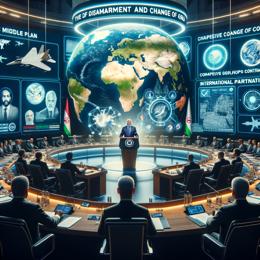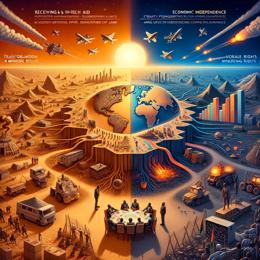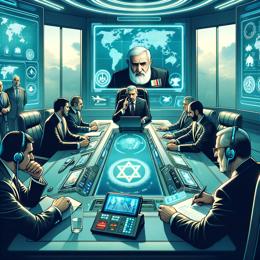Image: AI generated for illustration purposes
Efforts Intensify for Lasting Ceasefire in Gaza as CIA, Mossad, and Qatar Deliberate New Terms
In the pursuit of peace, top officials from the United States, Israel, and Qatar are intently negotiating to forge a durable truce in the Hamas-controlled Gaza Strip. The dialogue comes on the heels of escalating tensions that saw significant casualties and destruction over the recent weeks.
Among those present at the negotiation table in Doha was CIA Director William Burns. He, together with David Barnea, head of Mossad, met with Qatari Prime Minister Sheikh Mohammed Bin Abdulrahman al-Thani to contemplate the contours of what a lasting ceasefire could resemble. This meeting's significance is underscored by recent deadly clashes between Israel and Hamas that led to substantial loss of life and aggravation of humanitarian conditions in Gaza.
The urgency for a breakthrough was palpable as Qatar announced an extension of a preliminary truce, reflecting a delicate reprieve in the seven-week-long hostilities that had beleaguered the Gaza Strip. Weighing heavily on these talks are the harrowing realities faced by civilians caught in the crossfire; with the lamentable loss of over 15,000 lives, among which children constitute a staggering 40%.
The preliminary ceasefire already gave rise to some measure of prisoner exchange with Hamas releasing 50 Israeli women and children, while Israel, in a reciprocal gesture, freed 150 security detainees. In the efforts to build on this fragile trust, Hamas has agreed to let go of an additional 10 women and children each day for the duration of the renewed truce.
A broader framework for peace is still elusive, especially regarding the fate of Israeli men and military personnel held by Hamas. The details of the discussions remain closely guarded, but it is clear that any substantial roadmap towards lasting peace will have to address deeper issues, including the release of these captives.
The grim arithmetic of the conflict and the sobering toll on human life serve as a stark reminder of the importance of these talks. The international community watches with bated breath as Qatari mediation, so crucial given the country's influence on Hamas, seeks to transition from temporary halts in violence to an enduring cessation of hostilities that safeguards lives and facilitates reconstruction.
As the negotiators attempt to chart a course forward, the world can only hope that their efforts will herald an era of peace and stability for a region that has seen too much suffering.










